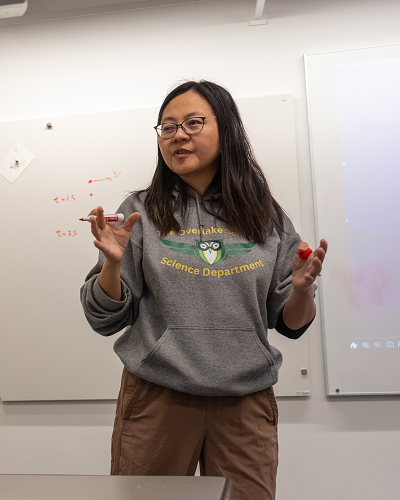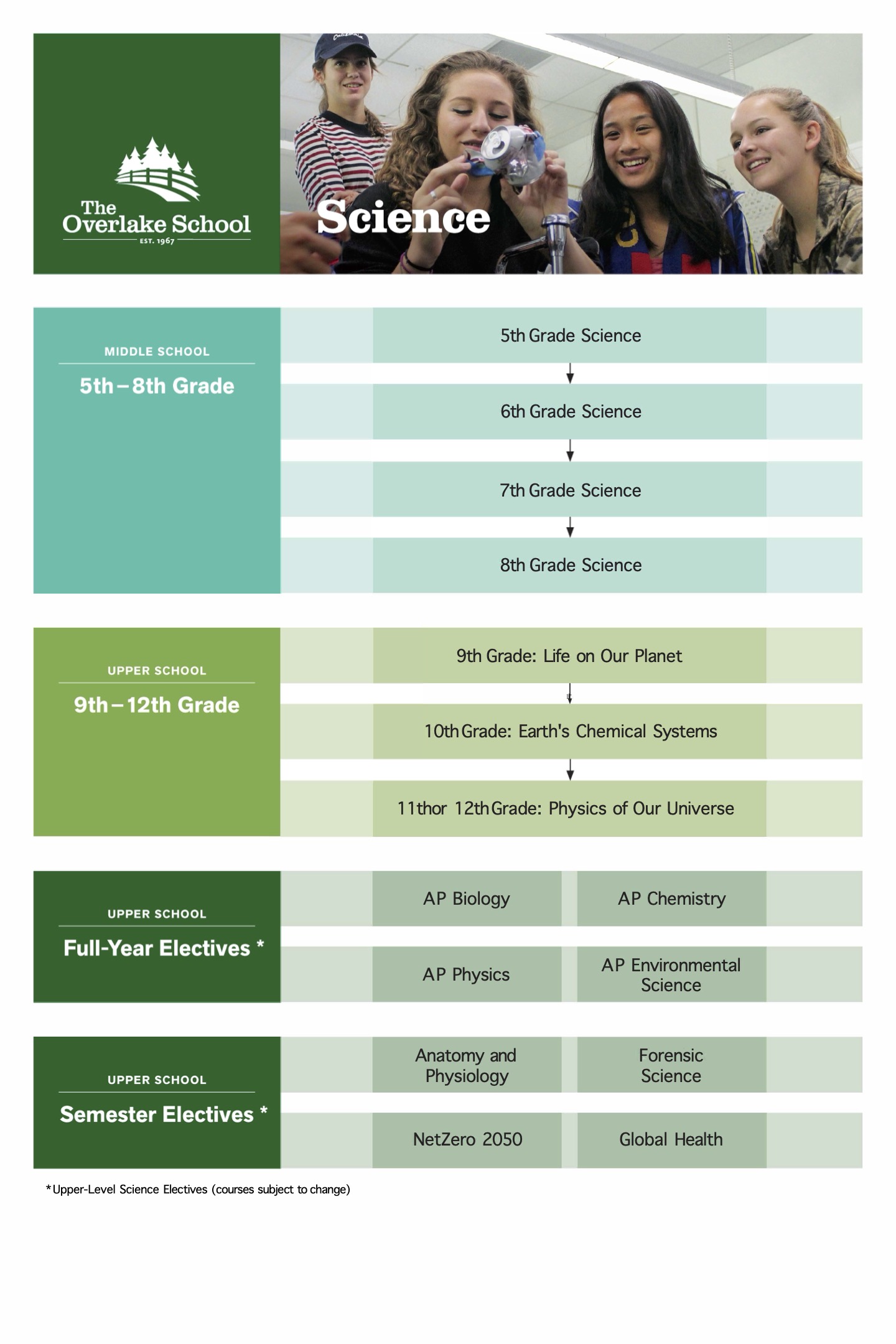Science
The aim of the Overlake School Science Department is to capitalize on students’ curiosity to engage them in a rich exploration of the natural world. By investigating natural phenomena and scientific issues, students will become more critical and ethical science practitioners. Students will learn to appreciate the complexity of the natural world, learn how to apply scientific methods to explore phenomena, and appreciate the contributions of diverse people in advancing scientific knowledge.
Throughout the course of their Overlake Career, students at Overlake will master a core set of Science Practices that align with Next Generation Science Standards (NGSS):
- Asking questions and defining problems
- Developing and using models
- Planning and carrying out investigations
- Analyzing and interpreting data
- Using mathematics and computational thinking
- Constructing explanations and designing solutions
- Engaging in argument from evidence
- Obtaining, evaluating, and communicating information
- The Science Practices are designed to spiral through the grade levels – skills students learn in one grade will become further developed in later years.
During the required years of study, students encounter concepts, principles, laws, and practices of science at successively higher levels of abstraction. The required course of study is designed to immerse students in the investigation of the nature and behavior of matter, energy, and living organisms. The departmental requirements prepare students for more advanced study both at Overlake and at college, as well as helping them develop an appreciation for the important role of science in their everyday lives.
The department staff is committed to active learning experiences, engaging the students in the process of science via lecture, discussion, inquiry, and laboratory work. Science teachers are also committed to intellectual integrity and personal responsibility. They will help students take pride in their own growth and the development of their abilities as young scholars. Honest effort and full engagement serve to enhance the students’ ability to think critically, communicate intelligently, and understand the wide range of people who have contributed to scientific discoveries and achievements.
CURRICULUM REQUIREMENTS
Science is required each year from 5-8. High school students are required to take three years of science. While each science course has a focus, they are all interdisciplinary to some extent.
Science 5
Fifth-grade science begins with an introduction to Next Generation Science Standards (NGSS) Science Practices and then applies them using the scientific method. The students use an inquiry-based approach to explore topics in the areas of physical science, earth science, and biological science. Students utilize investigatory skills to look for patterns, relationships, and connections between various topics of the different disciplines of science. Topics covered include: the nature of properly designed experimental procedures, properties of the Earth, interaction of species and their environments, and environmental awareness and stewardship.
Science 6
In sixth-grade science, students learn about the fundamentals of Chemistry before applying that knowledge to Biological systems. Topics covered include forensic science, medical phenomena, how organisms sustain life, and how traits are passed through generations. Students examine a range of phenomena within living systems, which they explain by gathering, interpreting, and communicating evidence. Students develop skills in the Science Practices of modeling, data analysis, arguing based on evidence, and constructing explanations.
Science 7
Seventh-grade science focuses on understanding what is happening in and on our Earth. Areas studied include rocks and landforms, earthquakes and volcanoes, weather and climate, and ecosystem interactions. The course uses an inquiry-based approach with students engaging in hands-on, collaborative investigations and practicing skills including modeling and scientific writing. There is also an emphasis placed on technology and using online resources to study our earth. The seventh-grade course continues to build on the Science Practices developed in sixth grade.
Science 8
Eighth-grade science is the final course in the middle school program. It emphasizes scientific inquiry and experimentation while helping students develop their academic skills and Science Practices. Eighth-grade science concentrates on the study of physics by investigating the concepts of motion, Newton's Laws, work, energy, and power, fluid statics and buoyancy, and sound and light wave phenomena.
Life on Our Planet
In this course, ninth graders engage in the practices of science to explore life at different scales, from the chemistry of biological molecules to the global flow of matter and energy. Students explore the relationship between molecular and cellular structures of organisms and their life functions, the transmission of traits across generations, the role of evolution in driving biodiversity, and the interdependent relationships between living things and Earth’s environment. Emphasis is placed on constructing explanations for biological phenomena, including the ability to connect structure to function and model the interactions among different scales of a system.
Earth’s Chemical Systems
Life on Our Planet (formerly Biochem I)
In this course, students investigate atomic and molecular structure, chemical reactions, and conservation and transfer of energy on the atomic and global scale. Through an exploration of atomic structure, students explain trends in elemental properties, chemical bonding, radioactivity, and generation of nuclear power. Chemical bonding in turn drives differences in the physical and chemical properties of matter. Students model how substances combine and change via collisions to explain rates of reaction and energy changes. Emphasis is placed on developing particle-level models, analyzing data, and mathematical reasoning to explain phenomena.
Earth’s Chemical Systems: Honors Option
Life on Our Planet (formerly Biochem I) plus recommendation of 9th grade teacher. Algebra II is a required co-requisite.
In the honors option for Earth’s Chemical Systems, students will explore the same concepts as in the non-honors course, though the depth and pace of the course will reflect a higher level of rigor. The honors section is best suited for students who tend to pick up concepts more quickly and can master introductory problem-solving strategies with fewer examples needed. This allows the class to investigate more advanced applications of concepts and to solve more complicated problems. As an honors level course, it is expected that students enter the course with strong work habits, complete homework on a nightly basis, read independently for understanding, and demonstrate self-advocacy skills.
Physics of Our Universe
Earth’s Chemical Systems (formerly Biochem II)
Physics of Our Universe is a year-long, laboratory-based course based on the Next Generation Science Standards (NGSS). The class integrates Physics, Earth and Space Science, and Engineering Practices. Topics to be investigated include Forces and Motion, Momentum and Collision, Energy, Rotational Motion, Space Science, Waves, and Electricity and Magnetism. Each unit is anchored by relevant phenomena and several student-centered labs and/or investigations. By using science and engineering practices, evidence from experiments, research, and observations, students will learn how to formulate questions, evaluate claims, use mathematics and computational thinking, and develop models to make interpretations and investigate the natural world.
Physics of Our Universe: Honors Option
Earth’s Chemical Systems (formerly Biochem II) and recommendation of current science teacher.
In the honors section of the physics class, students will explore the same concepts as in the non-honors course, though the depth and pace of the course will reflect a higher level of rigor. The honors section is best suited for students who tend to pick up concepts more quickly and can master introductory problem-solving strategies with fewer examples needed. This allows the class to investigate more advanced applications of concepts and to solve more complicated problems. As an honors level course, it is expected that students enter the course with strong work habits, complete homework on a nightly basis, read independently for understanding, and demonstrate self-advocacy skills.
AP Biology
Earth’s Chemical Systems (formerly Biochem II) and recommendation of 10th or 11th grade science teacher.
This year-long course focuses on the central ideas of biology. The course focuses on fundamental principles of evolution, cell structure and function, genetics, and ecology. The curriculum is demanding its scope and its level of sophistication, with emphasis placed on the application of biological principles to explain experimentally derived data and results. Students will read a variety of materials from textbooks to online scientific journals. As an AP course, AP Biology is equivalent to a first-year college biology course and often ends with taking the Advanced Placement exam in May. It is expected that students enter the course with strong work habits, complete homework on a nightly basis, read independently for understanding, and demonstrate self-advocacy. Students should expect to spend roughly an amount of time working outside of class equal to that spent in class. Lab reports and special projects may add to this time.
AP Chemistry
Earth’s Chemical Systems (formerly Biochem II) and recommendation of 10th or 11th grade science teacher.
This year-long, college level course expands upon many of the topics introduced in earlier courses. Students will begin with a study of the nature of matter, examining topics ranging from atomic structure to the structure and properties of matter to chemical reactions. An in-depth, experimental approach to the study of the behavior of matter will occur through an examination of reaction kinetics, equilibrium systems, and thermodynamics. Laboratory work plays a key role in the structure of the course, with emphasis placed on the application of chemical principles to explain experimentally derived data and results. While the Advanced Placement test is an important goal, emphasis will be placed on developing critical thinking and problem-solving skills. As an AP course, AP Chemistry is equivalent to a first-year college inorganic chemistry course. Therefore, it is expected that students enter the course with strong work habits, complete homework on a nightly basis, read independently for understanding, and demonstrate self-advocacy skills. Students should expect to spend roughly an amount of time working outside of class equal to that spent in class. Lab reports and special projects may add to this time.
AP Environmental Science
Earth’s Chemical Systems(formerly Biochem II) and recommendation of 10th or 11th grade science teacher.
The goal of this course is to provide students with the scientific principles, concepts, and methodologies to understand the complexities of environmental science. This involves investigating the flow of matter and energy through the living and non-living parts of the plane; identifying and analyzing environmental problems both natural and human-made; and examining solutions for resolving and/or preventing those problems. This course promotes environmental literacy to enable informed decision-making regarding issues that impact the environment and society. Additionally, this course will help establish and build a sense of stewardship for the environment, illustrating throughout the course that one person can make a difference. Environmental science is an interdisciplinary study that draws from the biological, physical, chemical, and earth sciences, as well as social sciences such as economics, politics, and sociology. Critical thinking and problem-solving applications are emphasized. As an AP course, AP Environmental Science is equivalent to a first-year college course. Therefore, it is expected that students enter the course with strong work habits, complete homework on a nightly basis, read independently for understanding, and demonstrate self-advocacy skills. Students should expect to spend roughly an amount of time working outside of class equal to that spent in class. Lab reports and special projects may add on to this time.
View the College Board AP Environmental Science Course Description.
AP Physics C: Mechanics
Physics of Our Universe (formerly Physics) and recommendation of physics teacher, plus completion or current enrollment in calculus.
This year-long college level course is an in-depth, calculus-based study of physics. It addresses the concepts of mechanics introduced in Physics of Our Universe but delves into the topics with much greater depth by employing an experimental and quantitative analytical approach to the material. Topics for study include Newtonian mechanics, the work-energy theorem, momentum and impulse, angular momentum, circular motion, rotational kinematics, dynamics and statics, and simple harmonic motion. All these topics will be covered at the calculus-based level and use of calculus in problem-solving and derivations increases as the course progresses. As an AP course, AP Physics C is equivalent to a first-semester college mechanics course. Therefore, it is expected that students enter the course with strong work habits, complete homework on a nightly basis, read independently for understanding, and demonstrate self-advocacy skills. Students should expect to spend roughly an amount of time working outside of class equal to that spent in class. Lab reports and special projects may add on to this time.
View the College Board AP Physics C (Mechanics) Course Description
Anatomy & Physiology
Life on Our Planet (formerly Biochem I), plus teacher recommendation for 10th graders.
The purpose of this class is to study the structure and function of several systems in the human body (circulatory, respiratory, digestive, excretory, endocrine, and reproductive). With an emphasis on the concept of homeostasis, students will examine the mechanisms by which these systems support the process of life. This course makes regular use of case studies. Students will act as detectives to diagnose patients and link symptoms of a disease to the underlying physiological causes. Students in this course will be engaged in a variety of laboratory projects, dissections, and model building exercises to gain a deeper understanding of body systems. They will also be asked to exercise their intellectual and creative capacity by researching a disease and presenting their findings in a case study of their own. Adequate preparation for class is required and will involve regular homework.
Forensic Science
Life on Our Planet (formerly Biochem I), plus teacher recommendation for 10th graders.
This cross-disciplinary, lab-based course will pull from knowledge in the fields of biology, chemistry, and physics to explore the science involved in forensic investigations. The class will feature hands-on learning as students analyze evidence and make conclusions based on their findings. Investigations will include analysis of blood evidence (such as blood typing, blood spatter, and DNA fingerprinting), physical evidence (such as soil and glass particles), trace evidence (such as hair and fibers), fingerprints, ballistics, forensic chemistry, and a look into modern biotechnology. Students will present their findings in a variety of ways, ranging from tests and quizzes, to papers, to presentations. An emphasis will be placed on continuing students’ development in the practices of science, such as analyzing and interpreting data, engaging in argument from evidence, planning and carrying out investigations, and constructing explanations. Due to the hands-on nature of this course, adequate preparation for class is required and will involve regular homework.
Net Zero 2050
Earth’s Chemical Systems (formerly Biochem II)
There is consensus among climate scientists that we need to prevent the earth from warming by more than 1.5°C to avoid experiencing the most severe consequences of Climate Change. This requires decreasing our greenhouse gas emissions to zero by 2050. Achieving this goal requires unprecedented, rapid, and far-reaching transitions in energy, industry, buildings, transportation, land-use, and cities. This will be one of the greatest scientific, industrial, economic, political, and societal challenges that humanity has ever faced. We know that this will be a monumental task, but how exactly can this be done? In this course, students will learn the physics, chemistry, biology, and earth science behind the solutions to the Climate Change crisis. They will address questions such as:
- What are the advantages and disadvantages of different renewable sources of energy? What are the associated costs?
- How can we store energy so it is available when it is needed most?
- How can we electrify the transportation sector?
- How can we design homes that produce all the energy they use, with enough left over to meet our personal transportation needs?
- How can we remove carbon from the atmosphere?
Students in this course will be engaged in a variety of laboratory and research projects. They will develop their data analysis, critical thinking, and problem-solving skills. They will work independently and collaboratively, with the end goal of creating a detailed plan for how to decarbonize our economy and society. This course will help to prepare students for their future and allow them to take advantage of new career and business opportunities.
Global Health - Not Offered This Year
Earth’s Chemical Systems (formerly Biochem II)
What makes people sick? How is the cause and spread of disease studied and assessed? What are key factors that determine health and well-being for all populations? What are the biggest challenges in global health today and how are these challenges being met? These questions lie at the heart of the study of global health and infectious disease. This course will enable students to develop an understanding of the nature of infectious disease and explore how this class of disease continues to be a central determinant for the health of all populations. Tackling the issue of global health and infectious disease from a variety of perspectives, our work will focus on developing an understanding of the basic concepts of infectious diseases, dynamics of disease transmission, as well as the impact that emerging and reemerging infectious diseases have on society. Students in this course will be engaged in a variety of laboratory and research projects. Therefore, adequate preparation for class is required and will involve regular homework.
Astronomy - Not Offered This Year
This semester-long course is an introduction to the universe, with an emphasis on conceptual rather than mathematical comprehension. Topics include modern theories of the universe, evolution of galaxies, quasars, stars, black holes, planets and solar systems. Current observational and research techniques will be explored through laboratory work. Students will have opportunities to utilize telescopes in both direct and remote observing. Major themes of astronomy which will be addressed in this course include:
- How has our understanding of our place in the Universe evolved over time?
- How are astronomers able to describe and understand complex phenomena utilizing only the light received from distant sources?
- What is the role astronomy plays in our daily lives, and in the future of humanity?
Evolution - Not Offered This Year
Earth's Chemical Systems.
This course will focus on developing an understanding of modern evolutionary theory by focusing on major topics within evolutionary biology. These include natural selection, descent with modification, relationships between modern and extinct species, mechanisms of speciation, and molecular evolution. By examining the breadth of current evidence for modern evolutionary theory, an understanding of the mechanisms of evolutionary change will then be applied to address a variety of questions. For example,
- How can we explain the incredible variety of living organisms on Earth?
- Why do some insects look like sticks?
- Are we, as humans, more closely related to insects or sea urchins?
- What is responsible for the current rise in multi-drug resistant bacteria?
- How can DNA analysis provided insight into where humans originated and how they came to populate the Earth?
Students in this course will be engaged in a variety of laboratory and research projects. Therefore, adequate preparation for class is required and will involve regular homework.
Materials Science - Not Offered This Year
Earth’s Chemical Systems
The course will introduce students to the fascinating world of materials science with a specific focus on daily polymers and composites. Materials Science is an interdisciplinary field that plays a crucial role in our daily lives, from the products we use to the technologies we rely on. By exploring the structure, process, properties and applications of polymers and composites through designed hands-on activities, students will
- gain a fundamental understanding of thermoplastic and thermoset materials.
- understand the molecular structure, classification, and properties of polymers.
- investigate the effects of temperature, composition and reinforcement on polymer properties.
- examine real-world application of thermoplastic and thermoset polymers and composites in industries like aerospace, automotive, construction etc.
- discuss the environmental impact of thermoplastic and thermoset polymers and composites.
- explore recycling and sustainable practices in materials science.
Assessment and Evaluation: Students will be evaluated through a combination of assessments, including quizzes, exams, laboratory reports, and project presentations. Class participation and engagement will also be considered in the final evaluation.
Reproductive Biology - Not Offered This Year
Earth’s Chemical Systems
Why do most animals need a partner to reproduce – and why are there some that don’t? Why are males and females so different in appearance and behavior in many species? How can a single cell become a complex, coordinated being with hundreds of tissue types and trillions of cells working together? In this class, students will explore the topic of reproductive biology through evolution, physiology, and development. They will learn how natural and sexual selection have shaped the myriad reproductive strategies employed by the plants and animals of the world. Students will explore the processes of sexual differentiation and development in animals and humans, with a focus on the hormones that shape our brains and bodies. Students in this course will be engaged in a variety of laboratory and research projects. Adequate preparation for class is required and students should expect regular homework.
Contact
Janet Jones
Science Department Chair
jjones@overlake.org




